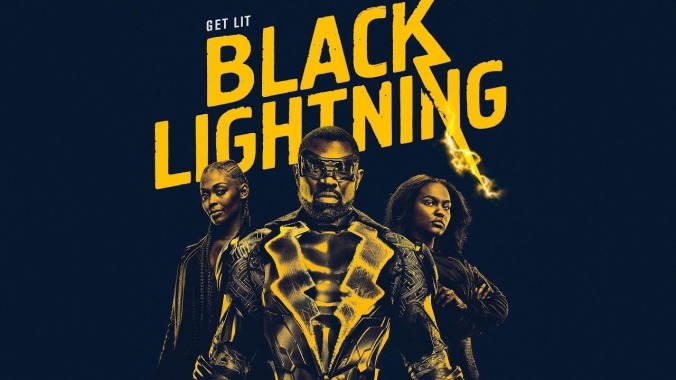Black Lightning’s series premiere gives us the mature, nuanced superhero show we need

There are a lot of superhero shows on The CW, and there’s a lot of superhero stories out there in general. You can’t log in to Netflix without seeing a new Marvel show promoted, and you can’t go a few weeks without seeing a new trailer or cast announcement for a Marvel or DC film. Standing out from the crowd is no easy thing to do. In fact, standing out might be discouraged; it’s safer to fall into the DC and Marvel formula, giving the people what they want, or what they’ve been conditioned to want. Some undoubtedly see a plethora of options, an exciting array of their childhood heroes come to life in various formats. Others, myself included, can’t help but see a machine churning out the same old story again and again, relying on nostalgia as a selling point rather than, with a few exceptions, a unique creative vision.
Black Lightning is different though, and that’s its greatest strength. While every other superhero show on The CW, no matter their various strengths, feels of a similar piece (and of course share a universe), Black Lightning is immediately established as something unique. It’s not just the obvious stuff, like the nearly all-black cast or the fact that the series premiere isn’t part of a drawn-out origin story. Rather, the difference is in the storytelling. Where Arrow and The Flash felt immediately part of a large, complicated universe, Black Lightning is much more intimate. “The Resurrection” is certainly about getting Principal Jefferson Pierce (Cress Williams) back into his role as Black Lightning, something he left behind nine years ago when it cost him his marriage. More importantly though, the premiere is about patiently establishing the structure and dynamics of Freeland, a city filled with violence and corruption, in order to tell us why Black Lightning matters.
“The Resurrection” wastes no time doing so. The scope of violence in the city is established immediately. As Jefferson Pierce sits in the police station, waiting for his oldest daughter Anissa (Nafessa Williams) to be released after getting arrested during a peaceful protest, a newsreel details the latest bout of shooting from the 100 Gang. The reporter states there’ve been 125 shootings over a single weekend, and while the mayor says that he’s frustrated by the violence, he’s also worried about the looting and vandalism. We come to understand Freeland right off the bat; it’s a complicated city, filled with well-meaning and inspiring people like Jefferson, who’s helped turn around Garfield High School’s graduation rate, and others who’ve been swept into gangs, complete with all the violence and drugs that come with it.
“The Resurrection” isn’t shy about drawing connections between Freeland and our own world. This isn’t a universe only populated by flashy superheroes and their evil counterparts, where the everyday citizens are nothing but fodder for evil intentions, but rather a real, living, breathing place that boasts all the social issues that plague our own communities. In the opening minutes Jefferson is pulled over by the cops while driving his daughter home from the police station. The stop quickly escalates, as Jefferson’s head is forced onto the hood of the cruiser. He’s a victim of racial profiling, “the third time this month.” It’s a powerful scene for the way it taps into real-world problems of police violence, but it’s also powerful in the way it shifts the narrative of the superhero. Black Lightning isn’t just a man fighting against a vague sense of injustice, but rather something more specific, more in tune with our current cultural and political moment, and that helps Black Lightning convey a strong voice early on.
 Keep scrolling for more great stories.
Keep scrolling for more great stories.
